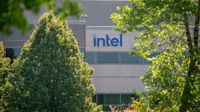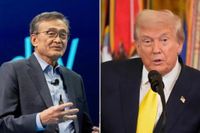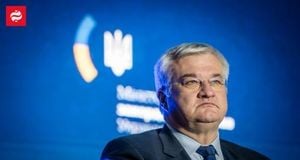Intel, one of the world’s most influential technology companies, found itself at the center of a political firestorm this week after President Donald Trump publicly called for the resignation of its newly appointed CEO, Lip-Bu Tan. The controversy, which erupted on August 7, 2025, has drawn attention to the intersection of business, national security, and the increasingly fraught relationship between the United States and China.
President Trump’s demand came in a characteristically blunt post on Truth Social, where he declared, “The CEO of Intel is highly CONFLICTED and must resign, immediately. There is no other solution to this problem. Thank you for your attention to this problem!” According to Reuters and CNBC, Trump’s statement followed a letter from Senator Tom Cotton (R-Arkansas) to Intel’s board chairman, Frank Yeary, raising concerns about Tan’s financial ties to Chinese companies, some allegedly linked to the Chinese Communist Party and the People’s Liberation Army.
The catalyst for the uproar was a Reuters report earlier in the year, which claimed that Tan had invested at least $200 million across hundreds of Chinese firms—some with military connections—between March 2012 and December 2024. Senator Cotton’s letter pressed Intel’s board for answers, specifically questioning whether Tan had divested from these companies to eliminate any potential conflicts of interest. “Mr. Tan’s associations raise questions about Intel’s ability to fulfill these obligations,” Cotton wrote, referencing Intel’s responsibility to comply with U.S. security regulations and act as a responsible steward of taxpayer dollars.
Complicating matters further, Tan had previously served as CEO of Cadence Design Systems, a company that last week agreed to pay more than $140 million to settle charges related to selling chips to a Chinese military institution. Although Tan was not named in the indictment, the timing of the settlement has fueled the controversy. Cotton’s letter also referenced Walden International, a venture capital firm focused on Asian investments, where Tan had a leadership role.
In response to the mounting scrutiny, Tan issued a letter to Intel employees on August 7, 2025, in which he firmly rejected what he described as “misinformation” about his past roles and business dealings. “I want to be absolutely clear: Over 40+ years in the industry, I’ve built relationships around the world and across our diverse ecosystem – and I have always operated within the highest legal and ethical standards,” Tan wrote, as reported by Reuters and OPB. He went on to emphasize, “My reputation has been built on trust – on doing what I say I’ll do, and doing it the right way. This is the same way I am leading Intel.”
Tan, who was born in Malaysia and grew up in Singapore, holds a bachelor’s degree from Singapore’s Nanyang Technological University and graduate degrees from MIT and the University of San Francisco. He succeeded Pat Gelsinger as Intel CEO in March 2025, after Gelsinger’s abrupt departure following a string of disappointing earnings and layoffs. Since taking the helm, Tan has faced both internal and external challenges, including a power struggle with Intel’s board over the company’s manufacturing strategy. According to The Wall Street Journal, some board members, led by Chairman Yeary, have explored selling or spinning off Intel’s manufacturing unit, even holding talks with Nvidia, Amazon, and TSMC.
Despite the swirling controversy, Tan has maintained that Intel’s board is “fully supportive” of his leadership and the company’s transformation plan. “We are engaging with the Administration to address the matters that have been raised and ensure they have the facts,” Tan said in his letter. He also expressed alignment with President Trump’s priorities, stating, “I fully share the President’s commitment to advancing U.S. national and economic security, I appreciate his leadership to advance these priorities, and I’m proud to lead a company that is so central to these goals.”
Intel, for its part, issued a statement reiterating its “deep commitment to advancing U.S. national and economic security interests” and highlighting its significant investments aligned with the President’s America First agenda. The company, which employs around 18,000 people in Oregon—down from a peak of 23,000—has faced mounting financial pressures in recent years. Intel posted nearly $19 billion in losses last year, and under Tan’s leadership has laid off more than 2,000 Oregon workers in 2025 and pulled back on manufacturing investments. These challenges have been compounded by fierce competition from rivals who have more quickly capitalized on the booming artificial intelligence sector.
The stock market’s reaction to the political drama was swift. Intel shares fell 3% on August 7, 2025, following Trump’s demand for Tan’s resignation, though they recovered slightly in premarket trading the next day. According to Gabelli Funds research analyst Ryuta Makino, however, the president’s statement is likely to be a short-term distraction. “It’s noise,” Makino told OPB. “I think it’s purely noise.” He suggested that investors are more focused on Intel’s financial performance than on the political spat, and that the administration’s efforts to broker major investment deals—such as Apple’s recent $100 billion supply chain commitment—may be the real story behind the scenes.
Political analysts see Trump’s move as part of a broader pattern in which the president leverages the power of his office to pressure companies and individuals. Chandler James, an associate professor of political science at the University of Oregon, told OPB that Trump’s approach is “not an isolated incident,” but rather “a part of a pattern of activity that seeks to use the power of the presidency—and all the resources of the government—to bring pressure on individuals and businesses, and groups such as universities or law firms, to change their policies in a way that Trump sees fit.”
Within the technology sector, the controversy has sparked debate about the limits of presidential influence over private companies. As CNBC noted, while it is legal for American business leaders to have holdings in other countries, the president does not have the authority to remove a company’s CEO. Still, the optics of Tan’s ties to China have become a political liability, especially given the current administration’s focus on national security and economic self-sufficiency.
Some industry observers, like Bernstein analyst Stacy Rasgon, believe that while Tan is not “conflicted,” his connections to China present “an increasingly bad look” in the current political climate. Rasgon also pointed out that Tan lacks the kind of personal relationship with Trump that might help defuse the situation. Recent company decisions, such as cutting some foundry projects, may not have helped matters either.
As the dust settles, Intel’s leadership faces the daunting task of navigating both internal corporate battles and external political headwinds. With the global semiconductor industry under intense scrutiny and the U.S.-China rivalry heating up, the company’s next moves will be closely watched—not just by investors, but by policymakers and the public alike.
For now, Lip-Bu Tan remains at the helm of Intel, standing firm in the face of political pressure and vowing to uphold the highest standards of integrity and trust as he leads the company through turbulent times.





